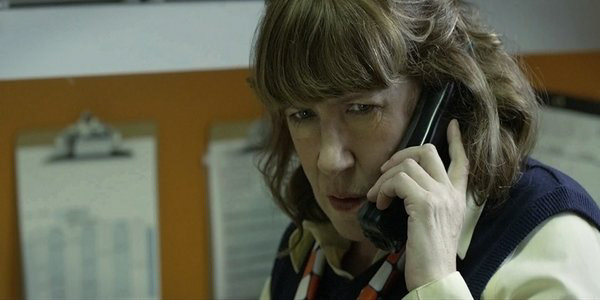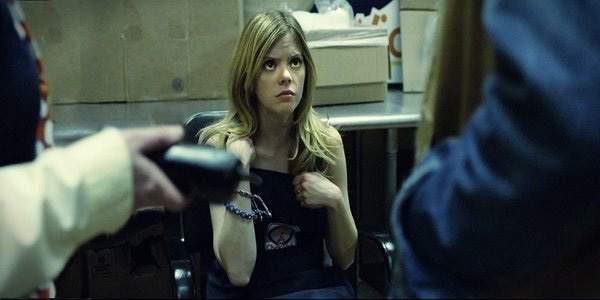COMPLIANCE: Making Us Question Authority

"We don’t make movies to make money, we make money…
There is sometimes stigma around police officers – do we trust them or do we not? Of course, the vast majority of police officers are in the field because they want to “protect and serve” the community. To protect and serve should always be an officer’s number one rule to live by.
As the people they are serving, we need to comply with what they ask of us if it’s going to make their job easier and if it’s going to make us safer. For example: if we get pulled over, as a general rule, the cop is always right in the moment. Do as they ask, and if you feel there’s a mistake, you can fight it afterward. Again, this is generally speaking, but it’s common sense to just do as they say. After all, they’re just doing their job.
However, after watching the 2012 film Compliance, the questions that remain are: what is common sense? Are people educated enough on what a police officer can and cannot do? How many real cops out there are abusing their power, and what can we do about it?
A Twisted, True Story
Compliance begins its story as a normal day at a fast food joint. The young employees come in for their shift, and the manager gives a little pep talk about how busy it’s going to be, so everyone needs to be on their game. Sandra (Ann Dowd) is an average manager. Becky (Dreama Walker) is a pretty cashier, just there to do her job. They and everyone else are seemingly normal, but are about to get seriously taken advantage of.
A man calls the restaurant, introducing himself as Officer Daniels (Pat Healy). He claims that Becky has stolen money from a customer and that they need to find it. The “officer” on the line doesn’t give an outrageous story: Becky stole money from someone’s purse, the woman who she stole from is there with him, and Becky should be watched until he’s able to get there. Where things get out of hand is when Officer Daniels insists that Sandra strip search Becky. While hesitant, Sandra agrees fairly quickly to do what he says. When Becky doesn’t immediately comply, he threatens to put her in jail for the night. That threat was enough to get Becky’s attention, and so she does it.

The movie goes on with Becky being babysat – while naked – by other employees who seem to understand a little more than Sandra that something is off here. Sandra, eager to please the police officer, gets her boyfriend Van (Bill Camp) to watch Becky in her absence. All the while, Officer Daniels is on the phone instructing them what to do. As soon as Sandra leaves her boyfriend with Becky, Officer Daniels tells Van to do things like jumping jacks, bend over, and ultimately leads Van to sexually assault Becky.
While watching the movie, it is frustrating to believe what is happening. If we don’t know ahead of time that this is based on real events, you might have a hard time wrapping your head around the plot. This is the weakest part of the film: you can’t believe it. That being said, it does raise extremely important questions.
Who Do We Blame?
The whole time you are watching this movie, you’re probably wondering “Why don’t you just say no?!” (which is asked at the end) or “How could Sandra, an adult, believe this is a real cop?!” These are valid questions, but the most alarming question is why do authority figures have this much control over us? Without even seeing this officer in person, Sandra complied with everything he asked of her. Becky, the victim in all of this, felt it was safer for her to go along with these twisted demands than to say “no” to a cop.
So, while this sick person pretending to be a cop is indeed psychotic, what’s possibly worse is that so many innocent people are so scared of the police that they don’t know when to say no.

A comparable movie that comes to mind is The Stanford Prison Experiment (2015), where a group of college students participate in a social experiment where some of them are prisoners and the others are prison guards. We quickly see how people can take advantage of power given to them. And, almost as alarming, even though everyone is fully aware that they are all pretending, the “prisoners” quickly become frightened of their fake guards.
Why did they all end up taking an experiment so seriously? Why didn’t the people in charge end it sooner? We are left with similar questions after watching Compliance. Whatever the answers are, we see the effect that power has on those who have it and those who are under it. The Stanford Prison Experiment too is based on a true story.
Compliance: What Do We Take From It?
It’s rare to find a movie as captivating as Compliance. It’s the kind of film that has you on the edge of your seat, yelling at the screen, afraid of what’s going to happen next. It is a plot-driven film that leaves you with more questions than answers.
What will really hit viewers when watching Compliance is that it’s also based on true events. There are multiple incidents where a person posed as a police officer on the phone and embarrassed, abused, and manipulated innocent people. Even watching this kind of abuse in a movie was difficult to swallow, so knowing this really happened is painful. This film raises some significant questions about how we see authority, and even what the purpose of having authorities is.
The police are there for us, and we should make it a priority to educate the public on what standard procedures are, and what our rights are.
What or who do you think is at fault in this story, and what can we do to prevent this from happening again in real life?
Compliance is available on Sundance Now.
Does content like this matter to you?
Become a Member and support film journalism. Unlock access to all of Film Inquiry`s great articles. Join a community of like-minded readers who are passionate about cinema - get access to our private members Network, give back to independent filmmakers, and more.
"We don’t make movies to make money, we make money to make more movies." -Walt Disney













